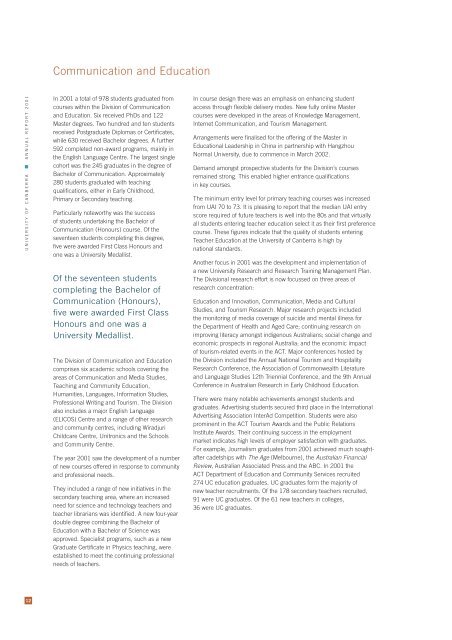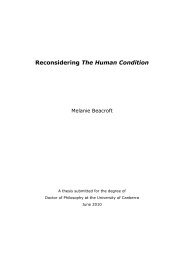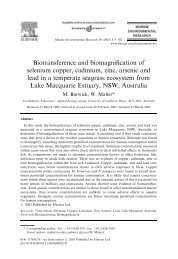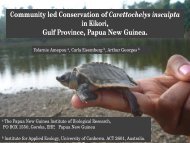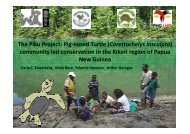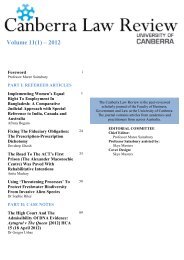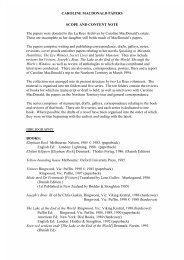Year 2001 - University of Canberra
Year 2001 - University of Canberra
Year 2001 - University of Canberra
You also want an ePaper? Increase the reach of your titles
YUMPU automatically turns print PDFs into web optimized ePapers that Google loves.
UNIVERSITY OF CANBERRA ANNUAL REPORT <strong>2001</strong><br />
12<br />
Communication and Education<br />
In <strong>2001</strong> a total <strong>of</strong> 978 students graduated from<br />
courses within the Division <strong>of</strong> Communication<br />
and Education. Six received PhDs and 122<br />
Master degrees. Two hundred and ten students<br />
received Postgraduate Diplomas or Certificates,<br />
while 630 received Bachelor degrees. A further<br />
592 completed non-award programs, mainly in<br />
the English Language Centre. The largest single<br />
cohort was the 245 graduates in the degree <strong>of</strong><br />
Bachelor <strong>of</strong> Communication. Approximately<br />
280 students graduated with teaching<br />
qualifications, either in Early Childhood,<br />
Primary or Secondary teaching.<br />
Particularly noteworthy was the success<br />
<strong>of</strong> students undertaking the Bachelor <strong>of</strong><br />
Communication (Honours) course. Of the<br />
seventeen students completing this degree,<br />
five were awarded First Class Honours and<br />
one was a <strong>University</strong> Medallist.<br />
Of the seventeen students<br />
completing the Bachelor <strong>of</strong><br />
Communication (Honours),<br />
five were awarded First Class<br />
Honours and one was a<br />
<strong>University</strong> Medallist.<br />
The Division <strong>of</strong> Communication and Education<br />
comprises six academic schools covering the<br />
areas <strong>of</strong> Communication and Media Studies,<br />
Teaching and Community Education,<br />
Humanities, Languages, Information Studies,<br />
Pr<strong>of</strong>essional Writing and Tourism. The Division<br />
also includes a major English Language<br />
(ELICOS) Centre and a range <strong>of</strong> other research<br />
and community centres, including Wiradjuri<br />
Childcare Centre, Unitronics and the Schools<br />
and Community Centre.<br />
The year <strong>2001</strong> saw the development <strong>of</strong> a number<br />
<strong>of</strong> new courses <strong>of</strong>fered in response to community<br />
and pr<strong>of</strong>essional needs.<br />
They included a range <strong>of</strong> new initiatives in the<br />
secondary teaching area, where an increased<br />
need for science and technology teachers and<br />
teacher librarians was identified. A new four-year<br />
double degree combining the Bachelor <strong>of</strong><br />
Education with a Bachelor <strong>of</strong> Science was<br />
approved. Specialist programs, such as a new<br />
Graduate Certificate in Physics teaching, were<br />
established to meet the continuing pr<strong>of</strong>essional<br />
needs <strong>of</strong> teachers.<br />
In course design there was an emphasis on enhancing student<br />
access through flexible delivery modes. New fully online Master<br />
courses were developed in the areas <strong>of</strong> Knowledge Management,<br />
Internet Communication, and Tourism Management.<br />
Arrangements were finalised for the <strong>of</strong>fering <strong>of</strong> the Master in<br />
Educational Leadership in China in partnership with Hangzhou<br />
Normal <strong>University</strong>, due to commence in March 2002.<br />
Demand amongst prospective students for the Division’s courses<br />
remained strong. This enabled higher entrance qualifications<br />
in key courses.<br />
The minimum entry level for primary teaching courses was increased<br />
from UAI 70 to 73. It is pleasing to report that the median UAI entry<br />
score required <strong>of</strong> future teachers is well into the 80s and that virtually<br />
all students entering teacher education select it as their first preference<br />
course. These figures indicate that the quality <strong>of</strong> students entering<br />
Teacher Education at the <strong>University</strong> <strong>of</strong> <strong>Canberra</strong> is high by<br />
national standards.<br />
Another focus in <strong>2001</strong> was the development and implementation <strong>of</strong><br />
a new <strong>University</strong> Research and Research Training Management Plan.<br />
The Divisional research effort is now focussed on three areas <strong>of</strong><br />
research concentration:<br />
Education and Innovation, Communication, Media and Cultural<br />
Studies, and Tourism Research. Major research projects included<br />
the monitoring <strong>of</strong> media coverage <strong>of</strong> suicide and mental illness for<br />
the Department <strong>of</strong> Health and Aged Care; continuing research on<br />
improving literacy amongst indigenous Australians; social change and<br />
economic prospects in regional Australia; and the economic impact<br />
<strong>of</strong> tourism-related events in the ACT. Major conferences hosted by<br />
the Division included the Annual National Tourism and Hospitality<br />
Research Conference, the Association <strong>of</strong> Commonwealth Literature<br />
and Language Studies 12th Triennial Conference, and the 9th Annual<br />
Conference in Australian Research in Early Childhood Education.<br />
There were many notable achievements amongst students and<br />
graduates. Advertising students secured third place in the International<br />
Advertising Association InterAd Competition. Students were also<br />
prominent in the ACT Tourism Awards and the Public Relations<br />
Institute Awards. Their continuing success in the employment<br />
market indicates high levels <strong>of</strong> employer satisfaction with graduates.<br />
For example, Journalism graduates from <strong>2001</strong> achieved much soughtafter<br />
cadetships with The Age (Melbourne), the Australian Financial<br />
Review, Australian Associated Press and the ABC. In <strong>2001</strong> the<br />
ACT Department <strong>of</strong> Education and Community Services recruited<br />
274 UC education graduates. UC graduates form the majority <strong>of</strong><br />
new teacher recruitments. Of the 178 secondary teachers recruited,<br />
91 were UC graduates. Of the 61 new teachers in colleges,<br />
36 were UC graduates.


